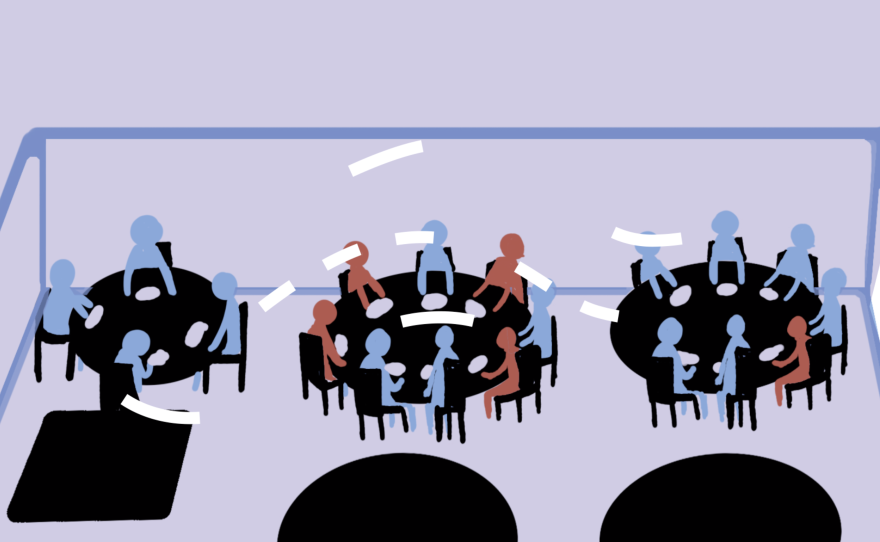We all know that if someone with the coronavirus coughs or sneezes on you, you're at risk of catching it.
But even when we speak or laugh or breathe, particles come out of our noses and mouths. Big bits of spittle can fly out when you're shouting and singing, along with respiratory droplets and tiny aerosolized particles that come out in clouds that may linger in the air. And if we're infected with the coronavirus — even if we don't have any symptoms — those excretions could contain live, contagious SARS-COV-2 that can make others sick.
In some settings — especially poorly ventilated indoor rooms where many people are gathering — researchers increasingly believe that clouds of the virus expelled when someone speaks are able to stay aloft in the air and potentially infect people farther away than the recommended 6 feet of social distance.
In these settings, an infectious person shouting or laughing or coughing can release clouds containing the virus that can build up, linger and waft in the air — and then be inhaled by passersby and settle in their lungs.
What's the evidence, you ask?
There was that time in late January, when 10 people were infected in a windowless restaurant in Guangzhou, China. More than 80 people had shared the dining room during the lunch period — but the 10 who got sick were all sitting in the path of one air conditioning vent that may have sucked in viral particles from someone in the room who was later confirmed to have COVID-19.
Another classic example scientists bring up is a choir practice, back in March in Washington state. Fifty-three out of 61 people who attended came down with COVID-19. The act of singing, where you're breathing deeply and projecting your voice, can spews tiny virus particles from deep inside the lungs that can then stay aloft in the air.
Researchers think those clouds of airborne coronavirus exhaled by infectious people may be a key factor in superspreading events — one gathering that results in a number of new cases.
Clusters of infections have also emerged among students returning to college dormitories in North Carolina, musicians and revelers in a nightclub district in Hong Kong, guests at a wedding reception in rural Maine, residents in a nursing home in The Netherlands, worshippers at a church in South Korea, staff and inmates at a prison in Ohio.
"We see this over and over and over again," said Maria Van Kerkhove, technical lead for the World Health Organization's emergencies program, on Aug. 21, "This virus is being driven by outbreaks in clusters."
What's still unclear is how long the virus lingers in the air, how far it travels through a room, how much you need to breathe in to get infected and how commonly it spreads this way.
But scientists say it's become increasingly clear that airborne virus particles help the coronavirus superspread.
So if a friend invites you over for drinks and you want to say yes, what can you do to protect yourself?
Make the indoors more like the outdoors
That's what researchers recommend, because it seems that airflow is a factor in transmission. "You limit aerosol transmission by increasing ventilation and increasing air circulation," says Seema Lakdawala, a flu researcher at University of Pittsburgh, which means opening the windows that surround you and putting fans in them, facing inward, to draw outside air in. That fresh air will scatter any clouds of virus that might exist. That way, you're less likely to breathe in a big infectious dose.
When you can, move your get-together outside to a location where fresh air is all around you — a backyard, for example. Lakdawala's neighborhood hosts happy hours, "where everybody brings a lawn chair and we sit on someone's lawn. Everyone is spatially distanced and brings their own drink."
Clean the air
Researchers recommend that you consider an air purifier if you periodically have guests over or if some members of your household work outside the home. "You wouldn't drink water downstream from another town without treating it. But we breathe air from other people without treating it," says Donald Milton, an infectious disease aerobiologist at the University of Maryland.
Effective air purifiers range from $100-$600, depending on technology, energy efficiency and the recommended room size, according to an analysis by Wirecutter.
And keep your distance
Much of this is common knowledge by now, but make sure you wear your mask correctly — making sure that it fits snugly over your nose and mouth while not obstructing your ability to breathe — and that you keep a personal space bubble of at least 6 feet between you and other people.
The mask will catch a lot of the droplets that come out when you speak or laugh or cough — and also block some of other people's droplets from getting into your nose and mouth.
Greet your friend with a wave or an air hug from 6 feet away. That personal space bubble — between you and others — means there's more air passing between you to dilute any virus clouds that might be expelled.
Ultimately, health officials say, there is no such thing as zero risk. But by keeping the air around you moving — you'll minimize your chances of inhaling a big, infectious whiff of virus.
Copyright 2020 NPR. To see more, visit https://www.npr.org.






